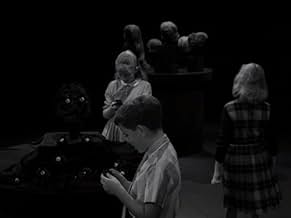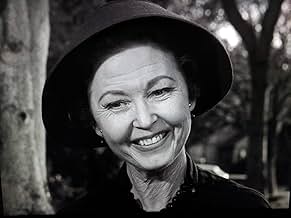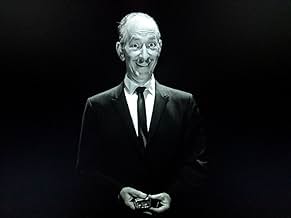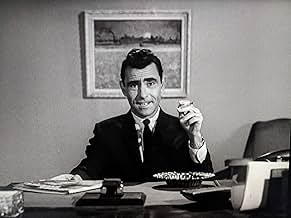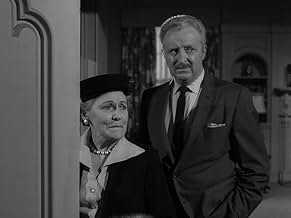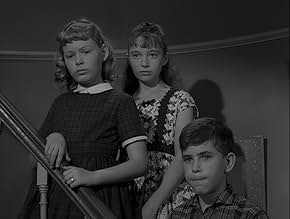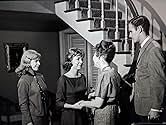I Sing the Body Electric
- L’episodio è andato in onda il 18 mag 1962
- TV-G
- 25min
VALUTAZIONE IMDb
7,1/10
2718
LA TUA VALUTAZIONE
Aggiungi una trama nella tua linguaRecent widower George Rogers, needing loving care for his three young children, orders a cybernetic "grandmother". While two of his children accept her, one of his daughters fiercely rejects... Leggi tuttoRecent widower George Rogers, needing loving care for his three young children, orders a cybernetic "grandmother". While two of his children accept her, one of his daughters fiercely rejects her, with near tragic consequences.Recent widower George Rogers, needing loving care for his three young children, orders a cybernetic "grandmother". While two of his children accept her, one of his daughters fiercely rejects her, with near tragic consequences.
- Regia
- Sceneggiatura
- Star
David Armstrong
- Van Driver
- (non citato nei titoli originali)
Rod Serling
- Narrator
- (non citato nei titoli originali)
- …
Recensioni in evidenza
I remember the story in a Ray Bradbury anthology. He had a thing for robots. This is a pretty lightweight effort. Not that it's a bad story; it's just that there are so many unanswered questions. Why did the cruel aunt not return at some point? How much does this cost? It's just taken for granted. That's why Ray Bradbury is a fantasist and less of a science fiction writer. The story is much more about the little girl coming to grips with the loss of her mother than the science. Robots have this thing about sacrifice and this comes through. Anyway, it all works out but we are left to guess the humanity of the robot. It's a feel good episode, but it isn't as gut wrenching as the reality of the little girl.
First off I am a huge fan of The Twilight Zone. But I have some questions about this episode. Maybe someone out there can comment in another review if you know the answers. One question is the little girl named Anne said her mother "let herself die". What did that mean exactly? Was it suicide? Or was she ill and did not seek treatment? Or something else. Another question is regarding the looks of the Robot Grandma. Two of the children decided to create it to look like their mother. However, the Robot is old or at least not young like I would assume the mother would be. So is the Robot an older version of the mother or was that plot device dropped?
This is a cute domestic TWILIGHT ZONE episode which - once more - speak to most audiences, I mean home audiences and family ones in particular. Nothing gloomy here, just a bit scary for the sixties future, and which is still in fashion now, in 2025 !! How robots - and Artificial Intelligence - will more and more monitor our lives. But this plot is not only this, it is also a moving and bitter in the end tale. However, this is a matter of point of view. Not amusing plot, but not downbeat or sad either, just a little story that helps you to think of the modern world and its corollary. Not the best of the whole show, and I would have imagined this story in SCIENCE FICTION THEATER, a fifties series dedicated to "domestic" science fiction, the close to reality science fiction. Without aliens, monsters or outerspace journeys.
This was such a beautiful, special episode that it stayed with me for years. And it was such lovely story that years later it was made into a special one-hour movie starring Maureen Stapleton, called "The Electric Grandmother".
Very touching, I can't believe all these other comments about how it was flat and not very well acted, I think this episode was just marvelous.
Not a scary episode, like some of the other old TZ episodes (like the one where the old lady in the wheelchair was getting crank calls on stormy nights, or where the kid could wish you into a cornfield, or where Talky Tina the doll would come kill the evil stepfather), although I did appreciate those other episodes for their uniqueness, as well.
Safe to watch with your kids, it won't scare them, and I have to recommend it, as someone who deals with the griefstricken in my work, as a great show to help people start addressing their grief, which usually includes - and usually starts with - anger.
Very touching, I can't believe all these other comments about how it was flat and not very well acted, I think this episode was just marvelous.
Not a scary episode, like some of the other old TZ episodes (like the one where the old lady in the wheelchair was getting crank calls on stormy nights, or where the kid could wish you into a cornfield, or where Talky Tina the doll would come kill the evil stepfather), although I did appreciate those other episodes for their uniqueness, as well.
Safe to watch with your kids, it won't scare them, and I have to recommend it, as someone who deals with the griefstricken in my work, as a great show to help people start addressing their grief, which usually includes - and usually starts with - anger.
TZ seemed (and still seems) to be largely categorized by many viewers as necessary to give jolts to senses that were and are dulled by life's overstimulation (a categorization obviously also assigned to Alfred Hitchcock). This could be a main reason why episodes like I SING THE BODY ELECTRIC might be panned (in this case, along with its original author, Ray Bradbury) when many actually find it as fine a TZ episode as MR. BEVIS, CAVENDER IS COMING, NIGHT OF THE MEEK, A GAME OF POOL, THE TRADE-INS, or even I AM THE NIGHT: COLOR ME BLACK. Such plainly human episodes as these (along with several more) were able to make their point without having to go to unsettling superhuman or subhuman bodily extremes to do so. Rod Serling made it a point of telling - and showing - more than one kind of tale, fully appreciating the fact that he had (and still has) more than one kind of audience...
Lo sapevi?
- QuizRay Bradbury submitted several scripts to The Twilight Zone, but this was the only one produced.
- BlooperAt the end, all three siblings go off to college at the same time. How could all three be the same age, unless they were triplets, adopted or a combination of something else? This quandary is not explained in the story. However, it's more likely that two of the children were already in college when the third was entering college.
- ConnessioniEdited from Ai confini della realtà: Young Man's Fancy (1962)
I più visti
Accedi per valutare e creare un elenco di titoli salvati per ottenere consigli personalizzati
Dettagli
- Tempo di esecuzione
- 25min
- Colore
- Proporzioni
- 1.33 : 1
Contribuisci a questa pagina
Suggerisci una modifica o aggiungi i contenuti mancanti

